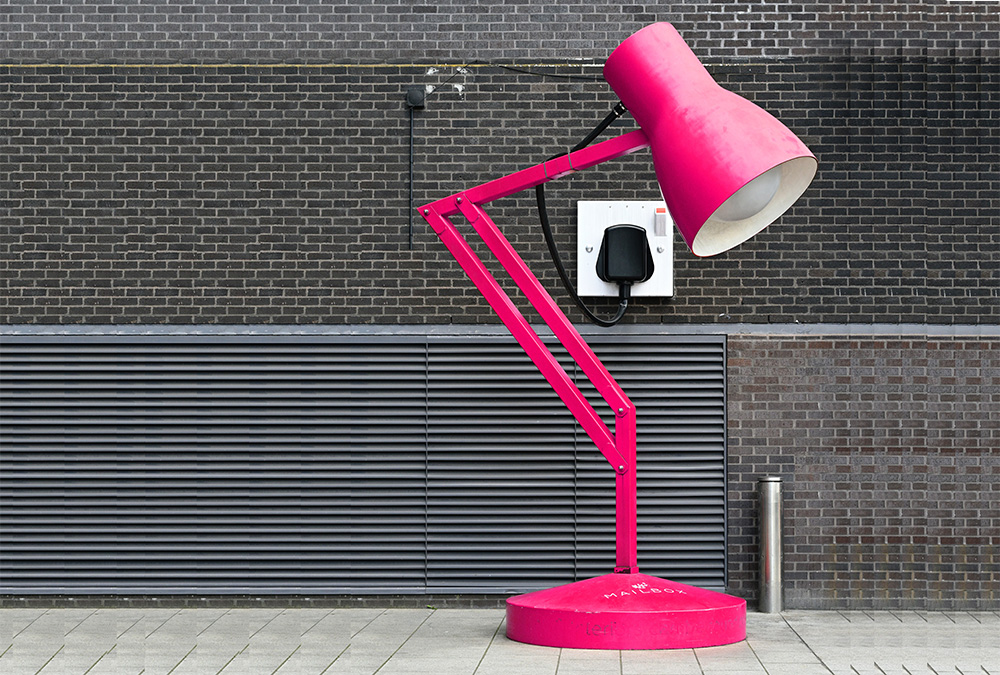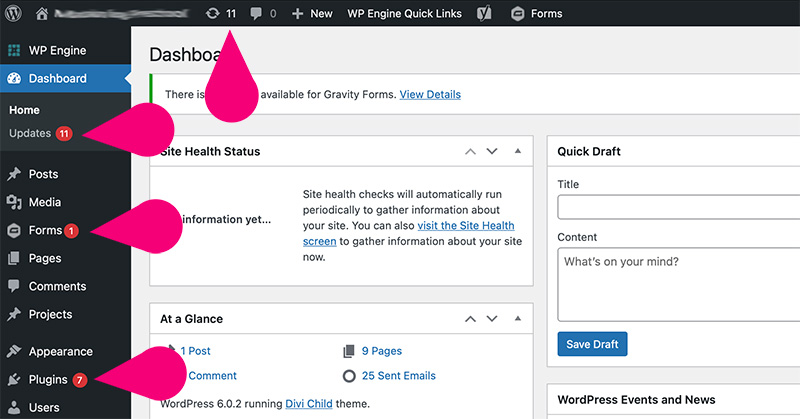If your website is built in WordPress, it most likely contains plugins. Plugins require updating on a regular basis to keep your website in a healthy and secure state. Do you need to know how to update WordPress plugins? Yes, you most definitely do. So what are plugins, and why does neglecting your updates matter?
What are plugins?
A plugin is software that is loaded to your WordPress site to do a specific job that default settings on your site don’t offer. They can be included to add new functionality or extend existing functionality that you already have on your site. As well as that, plugins are designed and built by experienced coders who are filling a niche with a product they create so that web designers don’t have to.
Why we use plugins
We use plugins because they are a fast and cost-effective way to incorporate the extended functionality we want to use on a website. For example, a plugin often used is a form plugin.
A WordPress install is a bit like a mobile phone with only the factory settings. Initially, it lands with some things already installed. However, you often want to add a few apps to make your phone do more of the cool stuff you want it to do.
WordPress plugins do exactly that, they give you more options. Just as there are phone apps for pretty much everything, there are over 50,000 WordPress plugins available that do just about anything you can imagine to extend functionality.
Why it’s crucial to know how to update WordPress plugins
Plugins must be updated regularly to maintain them. A great example is if you’ve ever hopped on a site and seen that something is a bit off or doesn’t work, we guarantee that no maintenance has been done on that website for a while, if ever.
Without a doubt, if you have an e-commerce website, you can’t afford to have broken functionality or site corruption.
Out-of-date plugins affect your site security and compatibility. Consequently, if you ignore plugin updates, you’re giving hackers an advantage when trying to get into your website. By ignoring updates, you could be putting sensitive information at risk.
Have the plugins on your site been updated?
We suggest you log in to your site after reading this article and double-check that your web company is updating plugins for you. If they haven’t, you’ll see red dots in the black top and side panels on your site’s dashboard. There will be a number inside the red dot. If the number is around five or less, your web company is most likely looking after updates for you; GREAT! If the number is 10, 20 or more, your site is not being maintained regularly. Feel free to get in touch if you are unsure; we’re happy to check for you.
Not sure about clicking buttons and doing backups or updating plugins?
If you don’t know how to update WordPress plugins, or you’re not comfortable updating plugins yourself, then hiring WordPress experts like us is the way to go. Keeping your site healthy and functioning as it should is so very important.
We always offer our clients the option of maintaining their plugins for them. After all, the cost to maintain your plugins is minimal compared to the cost of fixing the site if it starts to fail or gets hacked.
You’ve got to eat your greens ….
It can be a stressful task keeping your WordPress site up to date, but just like cleaning the bathroom and eating your greens, it has to be done. Try and ignore it and you might have a site failure and avoidable technical stress and debt to add to your daily workload.
Getting your plugins updated and site maintained
How much does it cost? Our basic starter maintenance cost to update all of your plugins on sites we build starts from just $40/month as of the date of this post. Not only do we update your plugins, but we also update your WordPress core and your theme. This is another crucial thing you have to do to keep your site secure.
What’s the catch? Why is our service so affordable? Well, there isn’t a catch except that we only maintain and update websites that we host, and our monthly hosting is just $45/month.
We don’t mind if we didn’t build your website; we are happy to host and maintain it for you. However, the cost will depend on the plugins and, more importantly, the number of plugins your website has. With plugins, less is best. The more plugins your site has, the more vigilant we need to be about conflicts.
Functionality that might require a plugin
All of the websites we create have a standard set of 5 plugins that we use. One customises the login experience, another controls the upload size of images. We use a plugin for adding all of the SEO, and we use one for integrating forms. The last one is for styling the forms.
We select plugins we trust and know are not likely to conflict with other plugins we use. It’s also important to select plugins that have ample installations and are well-supported by the builder.
Apart from the few we always use, we also have another standard set that is used to boost the themes we use. They may be included to create a popup offering or deliver a specific logo for each page or to add special design elements.
One of the most common reasons we add extra plugins is for e-commerce. We use a plugin that is well known and has plenty of extra extensions to customise the e-commerce requirements further.
This plugin has over 5 million installs and at the time of posting was updated 6 days before by the plugin engineers that built it.
Some plugins have annual licences or fees
The costs may vary if you have plugins that require licensing, we can check that and take care of it for you. Some need to be updated yearly. This is common on sites we inherit. Some companies choose not to invest in lifetime subscriptions and opt for the individual site owner to pay for an individual licence. More often than not, the site owner is unaware of this.
We were contacted about a site recently where the owner had not been able to edit her website for months. It wasn’t a site we hosted or maintain, but in this case, we were happy to help. The problem? The page builder needed its’ annual update and licence renewal. We were able to fix it for her, much to her relief. The implications? Her SEO was affected due to a lack of attention to content, so her traffic slowed down.
Your website isn’t a tool you can leave in the back of the shed to rust. It needs constant care and attention. We can help.


